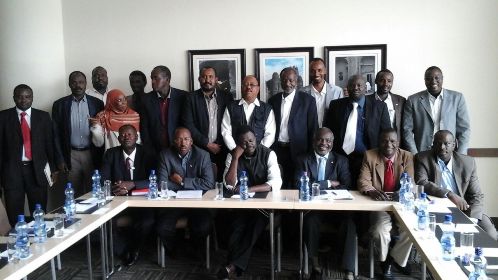Sudan, Darfur rebels trade accusations of stalling talks
By Tesfa-Alem Tekle
November 29, 2014 (ADDIS ABABA) – As Africa Union (AU) brokered peace talks between the Sudanese government and two rebel groups from the Darfur region come to a stalemate, the two sides on Saturday traded accusations of dragging the peace process.

Since 23 November delegations of the government and representatives of two rebel groups, the Justice and Equality Movement and the Minnawi faction of the Sudan Liberation Movement, (SLM-MM) are engaged in talks in Addis Ababa on a cessation of hostilities and security arrangements in Darfur.
In an interview with Sudan Tribune, Chief negotiator of the Sudanese government delegation, Armin Hassan Omer, accused the rebel negotiators of deliberately slowing the pace of the peace talks by bringing up issues not on the agenda.
“We are invited here to negotiate about a ceasefire that will lead immediately to a cessation of hostility agreement which would create conducive environment for the national dialogue,” said Omer.
The head of Darfur peace implementation office accused the joint rebel delegation of trying to open a new forum by bringing issues which he alleged an agreement had been reached in the past referring to the Doha Document for Peace in Darfur (DDDP).
“They are trying start a new forum and start debating the issue as if we have never dealt the matters before and that is unacceptable”.
He said the two sides have an agreement on the issues and was approved by the AU and the international community.
“We don’t know their motives behind but the rebels are actually trying to stop the talks,” he said adding “they are not ready now to proceed in the peace process”
Omar however said the government delegation is ready to reach agreement on cessation of hostilities if rebel groups are ready as well.
Otherwise he said the mediation has to revisit the whole idea of the peace process.
Omer suggested the mediation need to convince the rebels to loosen their position.
The rebels demand the inclusion of four issues including land, Hawakeer, borders and nomad issues, compensation, refugees and IDPs, reconstruction and development issues.
However the government says all these matters related to the situation in Darfur are dealt in the DDPD. According to Khartoum the discussions in Addis should not discuss matters included in the Doha framework agreement but the rebels reject this idea.
REBELS REACT
Ahmed Tugod, chief negotiator for the joint rebel groups’ to his side accused the government delegation of systematically holding back the talks from advancing with direct instructions from Khartoum.
“The government position is not reasonable and far from logic,” Tugod said “It is not realistic to avoid all the consequences and hide behind a failed document like Doha document as if there no any other problem in Darfur”
He said the government is selecting only one item (the cessation of hostility) from Doha document while ignoring other issues covered in the DDPD.
He added that reaching agreement on cessation of hostility is not enough to bring sustainable peace to Sudan.
“They couldn’t come up with a reasonable argument when we ask them why they are insisting that they are not mandated to talk about the root causes of this conflict and even the consequences”.
The current situation he stressed requires a quick stride forward taking all issues to be addressed on board before moving to the second stage of national constitutional dialogue.
“without addressing and resolving these issues there won’t be a peace process, negotiation or national dialogue leading to a collapse of the whole process and causing negative impact in the future of the country” he added.
The two parties have insisted on their positions and the mediation hasn’t yet decided on a specific plan on how to move forward the talks.
However mediators are expected to further hold consultative meetings with the two sides individually in a bid to break the deadlock.
When Sudan Tribune asked rebel head negotiator to suggest a possible way forward he said “the mediation has no alternative other than to put in the agenda the real issues irrespective of the objection of the Sudan government”
Conflict in Darfur, a region in western Sudan, which started in 2003 has killed an estimated 300,000 people and displaced two million.
(ST)
